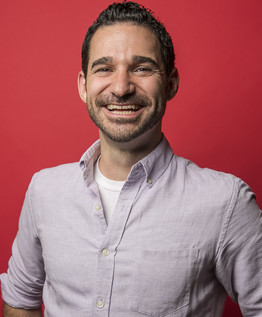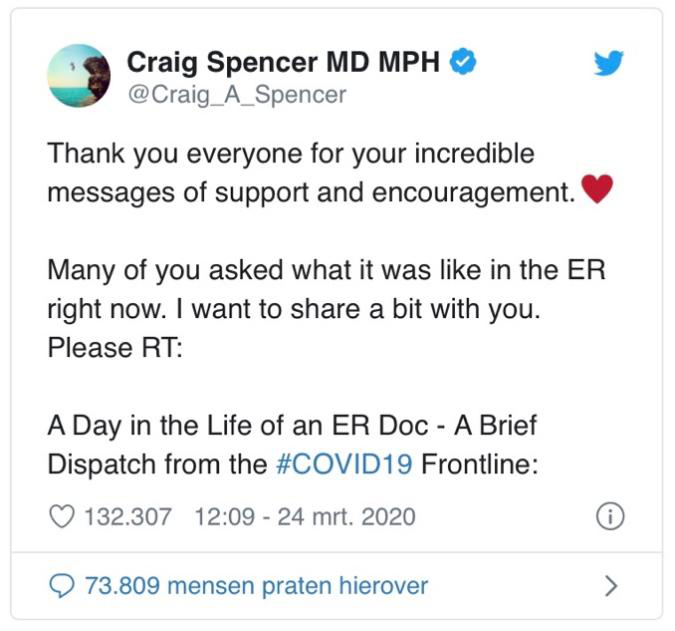美国抗疫一线医生克雷格·斯宾塞(Craig Spencer)表示对疫情发展十分担忧

克雷格·斯宾塞(Craig Spencer)医生的生活非常普通。早上六点半,他会为自己冲一杯咖啡,以维持精力,然后从家里出发,前往纽约市抗击新型冠状病毒肺炎疫情的前线。
斯宾塞是一名急诊室医生,同时也是纽约长老会医院/哥伦比亚大学医学中心急诊医学全球卫生总监。他曾在非洲和东南亚担任多个项目的实地流行病学家,研究医疗保健服务和人权的普及情况,包括调查布隆迪的死亡率和产妇健康状况,印度尼西亚法律文件的透明性,刚果民主共和国和南苏丹共和国地区紧急情况下的儿童疏散情况,并在埃博拉疫情爆发期间协调无国界医生在几内亚的流行病应对工作。2014年,他在西非几内亚照顾埃博拉病毒患者时被感染,成为纽约市第一位也是唯一埃博拉患者。
他对新冠肺炎疫情有独特的见解。他呼吁人们严肃对待这种疾病。
在美国节目《今日秀》的采访中,他说道:“病例每天都在增加,不久后我们的医院将不堪重负。按照我们医院使用呼吸机的速度,以及其他医院每小时就要给1至2位患者使用呼吸机的速度,这简单的数学计算表明,呼吸机用尽只是时间问题。”
他还表示,抗击新冠肺炎疫情比他在西非抗击埃博拉疫情更糟糕,因为那时他不用担心个人防护设备不足的问题。“不幸的是,这种病毒的传染性极强,各年龄段均可以感染。这种病毒的潜力实在令人恐惧。”他说。
3月23日,他在Twitter上分享了自己在急诊室的经历。截至23日,纽约市共有12,305例新冠肺炎病例。美国占全球病例近6%,使其成为全球疫情最严重的地区之一。

清晨的街道很安静,而急诊室里则是另一番景象。
“咳嗽声很刺耳。当你戴上口罩走进去后,你会发现不论年龄大小,几乎每个病人都有相同的症状:咳嗽、呼吸急促、发烧。”他在推文中写道。
“上午10点之前,我照看的两名患者都需要使用呼吸机。我们每一天的工作节奏都一样繁忙。”
有时候,他意识到自己这一天还没有喝水,但是他不敢取下面具。他回忆起自己在西非治疗埃博拉病毒的经历,那时候他连续数小时都没有喝水,就在推特上鼓励自己:“可以多坚持一会儿。”。
傍晚时分,他会在医院的自助餐厅中进行午休。在洗过两次手后,他会脱下口罩,快速就餐。
“我们这里的每一位医护人员都一样,把每个人都当作新冠肺炎患者。我们一整天都穿着防护服,戴着护目镜和口罩。这是保护我们安全的唯一方法。”他写道,“所有心脏病发作和阑尾炎患者都去哪儿了呢?现在所有患者都是新冠肺炎患者。”
当斯宾塞走出医院,他注意到医院外部与内部形成了鲜明的对比。
“街道是空的。这和医院里面完全不一样。也许人们不知道医院里正在发生什么。”斯宾塞这样想着,他所注意到的医院外部与内部之间的差异让公众难以想象新冠肺炎疫情给医院带来的严重打击。
他表示:“如果你看到的都是空荡荡的街道,那你确实很难理解疫情现状有多糟糕,也很难想象它将会发展到多么糟的地步。医院的容量正在接近极限。我们的呼吸机快要不够了。救护车也鸣笛不断。”
最后,斯宾塞呼吁公众帮助他们减慢病毒的传播速度。“我们无法完全阻止这种病毒,但是我们可以减缓它的传播。这种病毒不会感染它从未接触过的人。”他说,“请呆在家里。只有在家隔离能够拯救我们。我对美国挽救生命能力的关注远大于对其经济影响力的关注。你可能会听见有人说新冠肺炎疫情不是真的,还有人说疫情发展趋势并不糟糕,也有人说新冠肺炎不会致死。但这一切都是真的。”
An ER doctor who survived Ebola shares the harrowing reality of the coronavirus pandemic and levels a stark warning
Dr. Craig Spencer starts his day ordinarily enough. At 6:30 a.m., he brews coffee, enough to last him the whole day. From there, he heads to work, where he’s on the frontlines of the city’s fight against the coronavirus pandemic.
Spencer is an emergency-room doctor and the director of global health in Emergency Medicine at New York-Presbyterian/Columbia University Medical Center. He has worked in Africa and Southeast Asia as a field epidemiologist on numerous projects examining access to medical care and human rights, including measuring mortality and maternal health in Burundi, access to legal documentation in Indonesia, child separation in emergencies in D.R. Congo and South Sudan, and coordinating Doctors Without Borders national epidemiological response in Guinea during the Ebola outbreak. After caring for patients with Ebola in Guinea in West Africa, he became New York City’s first and only Ebola patient in 2014.
Spencer has a unique perspective on the coronavirus pandemic. He warns that people should take this disease just as seriously.
During an interview on NBC's “TODAY Show”, Spencer warned that patient “case numbers are increasing on a daily basis and soon our hospitals are going to be overwhelmed. At the rate that we’re putting people on ventilators, at some hospitals one to two per hour, the simple math shows it’s only a matter of time until we run out.”
“This coronavirus pandemic is worse than working in West Africa during Ebola because I never once worried about my personal protective equipment in West Africa,” Spencer said. “This virus unfortunately is perfect in the sense that it spreads really really well, it hits all age groups,” Spencer said. “It’s really scary the potential this virus has.”
On Twitter, he shared what his day was like on Monday, March 23 in the emergency room. As of this Monday, there were 12,305 coronavirus cases in New York City. Overall, the state accounts for nearly 6% of worldwide cases, making it a center of the pandemic.
While the streets outside in the early morning are pretty quiet, inside is a different story.
“There is a cacophony of coughing. When you put on a mask and walk in, you will find that nearly every patient, regardless of age, is experiencing the same symptoms: Cough, shortness of breath, fever,” he tweeted.
Before 10 a.m. two patients he’s seeing need to go on ventilators to help them breath. The day carries a similar rhythm based on the symptoms.
At some point, he tweeted, he realizes he hasn’t drank water. At the same time, he doesn’t want to remove his mask. He recalls his experience treating Ebola in West Africa in which he went hours without drinking water. “Surely you can last a little longer,” he tweeted.
Lunch break comes in the late afternoon in the hospital’s cafeteria. After washing hands twice and taking off his mask, he eats quickly.
“Nearly everyone you see today is the same. We assume everyone is COVIDー19. We wear gowns, goggles, and masks at every encounter. All day. It’s the only way to be safe,” he wrote. “Where did all the heart attacks and appendicitis patients go? Its all COVID.”
Outside, he notes a stark contrast to what is happening within the busy walls of the hospital.
“The streets are empty. This feels nothing like what is happening inside. Maybe people don’t know???” he tweeted. The difference between the outside world and inside the hospital, he noted, will make it hard for people to understand how severely the pandemic is hitting hospitals.
“You reflect on the fact that it’s really hard to understand how bad this is – and how bad its going to be – if all you see are empty streets,” he tweeted. “Hospitals are nearing capacity. We are running out of ventilators. Ambulance sirens don’t stop.”
Spencer ended his thread by telling the public to help in slowing the virus. “We were too late to stop this virus. Full stop. But we can slow it’s spread. The virus can’t infect those it never meets. Stay inside,” he tweeted. “Social distancing is the only thing that will save us now. I don’t care as much about the economic impact as I do about our ability to save lives. You might hear people saying it isn’t real. It is. You might hear people saying it isn’t bad. It is. You might hear people saying it can’t take you down. It can,” he wrote.
来源:Business Insider, CNBC, Columbia University Mailman School of Public Health
温馨说明:本栏目中文内容由我会根据来源处内容整理并翻译。
(责任编辑:宣传联络部)